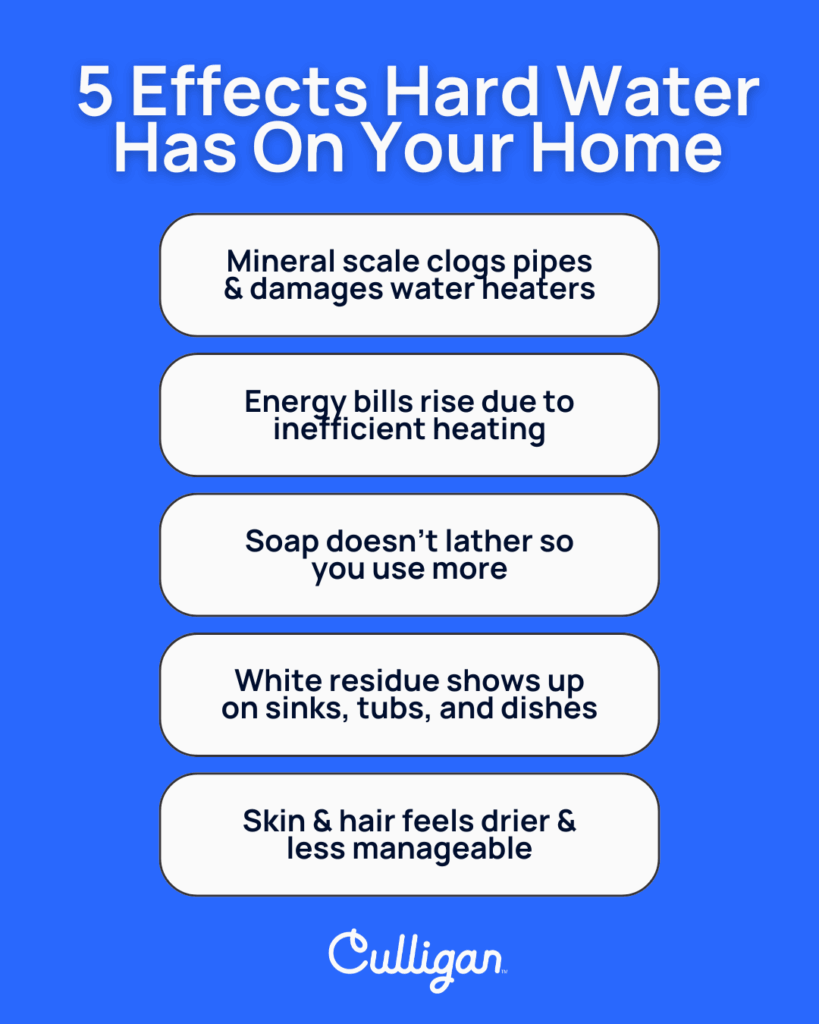Does Pinellas Park Have Hard Water?
Quick Summary: Pinellas Park, Florida, has hard to very hard water, averaging 210 ppm (12 gpg) according to the 2024 Pinellas County Utilities Water Quality Report. The city’s supply comes from a blend of groundwater, surface water, and desalinated seawater managed by Tampa Bay Water. While treatment ensures safety, hardness minerals remain, leading to scale buildup, cleaning challenges, and higher household costs. Culligan of the Gulf Coast offers free water testing, whole-home softeners, and reverse osmosis systems to help residents enjoy softer, cleaner water.
Living With Hard Water in Pinellas Park
If you live in Pinellas Park, you’ve probably noticed cloudy spots on dishes, scale forming on faucets, or your water heater working harder than it should. These are classic signs of hard water — and yes, Pinellas Park has it.
Unlike some places where hardness fluctuates only slightly, Pinellas Park’s supply comes from a blend of groundwater, surface water, and desalinated seawater. This mix, managed by Tampa Bay Water and Pinellas County Utilities, leads to hardness levels that are consistently in the hard range.
Pinellas Park Water Hardness Levels
Hard water contains calcium and magnesium minerals absorbed as water moves through soil and rock. The more minerals present, the “harder” the water becomes.
- Measured in: milligrams per liter (mg/L) or grains per gallon (gpg)
- Hard classification: Above 121 mg/L or 7 gpg
- Very hard: Above 180 mg/L or 10.5 gpg
According to the 2024 Pinellas County Utilities Water Quality Report:
- Average hardness: 210 ppm (≈12.3 gpg)
- Range: 168–252 ppm
- Classification: Hard to very hard
This means nearly every home in the city is dealing with water that leaves behind visible buildup and gradually wears down pipes and appliances.
Where Does Pinellas Park Get Its Water?
Pinellas Park’s water supply isn’t from one source alone. Instead, Tampa Bay Water blends multiple supplies to serve the community, including groundwater from the Floridan Aquifer, surface water from the Alafia and Hillsborough Rivers, and desalinated seawater from Hillsborough Bay.
Groundwater typically carries more dissolved minerals, which is why hardness levels stay high. Blending in surface and desalinated water helps balance the supply, but calcium and magnesium remain.
Contaminants Found in Pinellas Park Water
The hardness minerals are only part of the picture. The 2024 report also highlights other substances that can affect water quality:
- Chloride: 23 ppm average
- Sulfate: 65 ppm average
- Total Dissolved Solids (TDS): 337 ppm average
- Disinfection byproducts: Haloacetic acids (HAA5) and total trihalomethanes (TTHM)
- Chloramines: Used as the primary disinfectant
All of these remain within EPA and Florida DEP safety limits, but they contribute to taste, odor, staining, and scaling issues.

How Hard Water Affects Your Home
For homeowners in Pinellas Park, the impact of hard water is both visible and costly.
Scale builds up inside water heaters, dishwashers, and pipes, making them less efficient and more prone to repairs. Laundry can feel stiff, soap doesn’t lather well, and skin and hair often feel dry after showers.
Over time, these small frustrations lead to bigger expenses, including higher utility bills, premature appliance replacement, and more frequent plumbing repairs.
Water Treatment in Pinellas Park
Pinellas County Utilities and Tampa Bay Water test more than 12,500 samples annually to ensure water safety. Treatment steps include:
- Disinfection with chloramines
- Corrosion control measures
- Hydrogen sulfide removal at the Eldridge-Wilde Wellfield
These measures protect health, but they don’t remove hardness minerals — which is why the problems persist.
Solutions for Hard Water in Pinellas Park
Residents have several options to protect their homes from hard water damage:
Whole-Home Water Softeners
- Remove calcium and magnesium
- Prevent scale buildup and extend appliance life
- Improve soap and detergent effectiveness
Point-of-Use Filtration
- Reverse osmosis systems reduce minerals and other contaminants
- Provides cleaner, fresher drinking and cooking water
Combined Systems
- Installing softeners with reverse osmosis ensures softer household water and safer, better-tasting drinking water
Culligan’s Approach in Pinellas Park
Culligan Water of the Gulf Coast has decades of experience helping Pinellas Park households tackle hard water. Their services include free in-home water testing, professional installation of high-efficiency softeners, and reverse osmosis filtration systems designed for Florida’s unique conditions.
Final Verdict
Yes — Pinellas Park has hard water. With an average hardness of 210 ppm (12 gpg), the city’s supply falls squarely into the hard-to-very-hard range. Combined with other minerals and disinfectant byproducts, it impacts daily life, comfort, and long-term household costs.
The best first step is a free water test. Culligan makes it simple for Pinellas Park families to understand their water quality and choose the right solution for softer, cleaner water.
